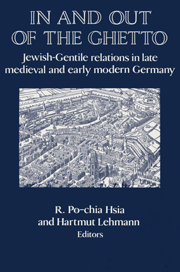Book contents
- Frontmatter
- Reflecting on German-Jewish History
- Part I The Legacy of the Middle Ages: Jewish Cultural Identity and the Price of Exclusiveness
- Part II The Social and Economic Structure of German Jewry from the Fifteenth through the Eighteenth Centuries
- Part III Jewish-Gentile Contacts and Relations in the Pre-Emancipation Period
- 8 Languages in Contact: The Case of Rotwelsch and the Two “Yiddishes”
- 9 Meeting on the Road: Encounters between German Jews and Christians on the Margins of Society
- 10 Contacts at the Bedside: Jewish Physicians and their Christian Patients
- 11 Contacts and Relations in the Pre-Emancipation Period - A Comment
- Part IV Representations of German Jewry Images, Prejudices, and Ideas
- Part V The Pattern of Authority and the Limits of Toleration: The Case of German Jewry
- Part VI Through the Looking Glass: Four Perspectives on German-Jewish History
- Index
11 - Contacts and Relations in the Pre-Emancipation Period - A Comment
Published online by Cambridge University Press: 05 January 2013
- Frontmatter
- Reflecting on German-Jewish History
- Part I The Legacy of the Middle Ages: Jewish Cultural Identity and the Price of Exclusiveness
- Part II The Social and Economic Structure of German Jewry from the Fifteenth through the Eighteenth Centuries
- Part III Jewish-Gentile Contacts and Relations in the Pre-Emancipation Period
- 8 Languages in Contact: The Case of Rotwelsch and the Two “Yiddishes”
- 9 Meeting on the Road: Encounters between German Jews and Christians on the Margins of Society
- 10 Contacts at the Bedside: Jewish Physicians and their Christian Patients
- 11 Contacts and Relations in the Pre-Emancipation Period - A Comment
- Part IV Representations of German Jewry Images, Prejudices, and Ideas
- Part V The Pattern of Authority and the Limits of Toleration: The Case of German Jewry
- Part VI Through the Looking Glass: Four Perspectives on German-Jewish History
- Index
Summary
A student in a large lecture class of mine on the Holocaust once prefaced a question with the statement that “unlike you, we, after all, did not experience World War II.” Since I was born several years after 1945, my student's remark obviously wounded my vanity! Reading the essays by Wexler, Guggenheim, and Jütte in Part III of this volume brought my student's remark to mind. All three essays are markedly postwar in theme and method. Each of the authors challenges and problematizes one or another strand in the classic, pre-1933 model of how to write the German-Jewish past. All three essays reflect a shift, sometimes a dramatic one, in our thinking about the German-Jewish past. All three essays reflect new subjects of research, new sources, and point toward fundamentally new conclusions about the vanished subculture that was German Jewry.
Perhaps it sounds odd, almost a half century after 1945, still to be contrasting new work with the picture of German Jewry presented by historians before the Holocaust. Surely that event was the most dramatic watershed imaginable, with huge implications for history writing, and it has also been over for quite a long time. No one would deny that German-Jewish history as it had been known ended at the hands of the Nazis. And that particular kind of ending to the story has, indeed, generated row upon row of books, whose authors aim to explain how things came to such a very bad end for the Jewish Germans. Much of this postwar scholarship is saturated with a retroactive pessimism - a tone, sometimes explicit, sometimes implicit, of inevitability.
Information
- Type
- Chapter
- Information
- In and out of the GhettoJewish-Gentile Relations in Late Medieval and Early Modern Germany, pp. 151 - 158Publisher: Cambridge University PressPrint publication year: 1995
